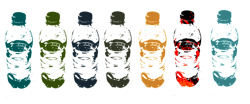Barbara L. Marteney and Kristin M. Saltzgiver of National Testing Laboratories, Ltd. specialize in consulting with bottled water companies regarding testing requirements. They maintain contacts with bottled water regulators, industry associations and the FDA regarding regulatory changes and bottled water issues. They have authored numerous articles regarding state, federal and international bottled water regulations. Marteney (ext. 217) and Saltzgiver (ext. 215) may be reached at 800-458-3330 or 440-449-2525; e-mail [email protected].
undefinedYour natural spring, well or artesian well source already may be providing you with the "best water you’ve ever tasted" with little effort on your part. However, selling that same water for public consumption puts you under government scrutiny.
In order to have your source licensed, many states require that a hydrogeological report accompany the application. Anyone who is serious about getting into the bottled water business should contact a hydrogeologist who specializes in bottled water development.
Water matrix, regional geology, source location, federal, state and/or local legislation, supply and demand can greatly affect the value of the source. Preliminary analysis of the water and a professional site assessment early in your planning will help ensure a more efficient source development process.
A hydrogeologist will visit your source site to assess various factors such as water quality. Preliminary analysis for relatively common parameters that may affect suitability for bottled water and treatment options. Preliminary analysis should include at least the following: arsenic and other heavy metals, bromide, bromate, iron, manganese, nitrate, sodium, volatile organic compounds, pesticides, herbicides and coliform bacteria. Other information that also can be helpful at this stage includes calcium, magnesium, potassium, chloride, sulfate, fluoride, bicarbonate, pH, total dissolved solids and alkalinity.
The outcome of the preliminary analysis is a key factor in determining if the potential source will be worth your investment.
- Geological setting surrounding the source of water—Types of rock, surficial deposits, bedding orientation, faults, etc.
- Hydrology—Amount of water available as affected by flow rate, seasonal variations and recharge area.
- Hazard determination—Likelihood of surface water contamination or activities in the surrounding area that may lead to contamination (e.g., landfills, illegal dumping, manure storage, etc.).
- Determine "type" of water—Water classification according to FDA Standards of Identity ("Spring Water," "Well Water," "Artesian Water").
- Logistical considerations—Land available for development of satellite source, roadways and transportation routes in conjunction with local development ordinances.
- Development strategies—Discuss plans for the type of source development that is best suited to the source based on all of the above mentioned criteria.
It is wise to follow a plan that has been prepared by a qualified hydrogeologist with bottled water experience. Many states have programs for licensing geologists who are qualified, through experience and training, to conduct geological evaluations. Make sure the reports from the hydrogeologist working on your project will be accepted by your state.
The costs involved with developing a water source for bottled water use generally range between $60,000 and $300,000 (or possibly higher). These costs typically involve the hydrogeological report, engineering reports, storage tanks, disinfection equipment, roads, fencing, electrical components, borehole, spring box and state licensing fees. Licensing fees vary based on the states in which your water will be sold.
The price at which bulk water typically is sold for bottled water use can range from $.0125 per gallon to $.06 per gallon. The price per gallon will be affected by the volume of water being sold; proximity of the source to the plant or market; supply and demand in the area; and who installs and maintains the necessary equipment (source owner or bottler).
Starting the development process with all the facts up front can help you avoid costly mistakes down the road. So, our best advise would be to consult a professional.
Type of Source and Water Definition
Spring Water
Flows naturally to the surface from a confined underground formation without any man-made assistance; may be collected via a borehole
Well Water
Hole bored or drilled in the ground that taps into an underground aquifer
Borehole Water
Taps into the underground formation feeding the spring source; allows for better control over water withdrawal
Artesian Well Water
Taps into a confined underground aquifer with a water level that stands above the water table (referred to as an "artesian head").
Key Questions to Ask a Hydrogeologist
- What is the quality of the water?
- What is the geology of the surrounding area?
- What is the hydrology of the source?
- Are any potential sources of contamination apparent?
- What can I call the water ("Spring," "Artesian"...)?
- What is the recommended course of action for development?
References & Sources
The information in this article was compiled with the help of the following professionals. For more in-depth information or to discuss your specific needs, please feel free to call one of the following people who provided assistance.
Tom Brewer, Hidell Eyster
Hingham, MA
[email protected]
781-749-8040
Mark Dubois, Woodard & Curran
Portland, ME
www.woodardcurran.com
207-774-2112
Ken Milender, Atlantic Geo-Science
Gilford, NH
www.geo-science.com
800-380-2472
Jim Richard, J. K. Richard & Associates
Greenville, TN
[email protected]
423-638-5854
Max Wyeth, American Aquasource
St. Joseph, MO
www.aqua-source.com
www.bottlingsystems.com
800-233-5110
Other helpful websites:
International Bottled Water Association (IBWA)
www.bottledwater.org
Bottled Water Web
Arthur Von Weisberg
www.bottledwaterweb.com


